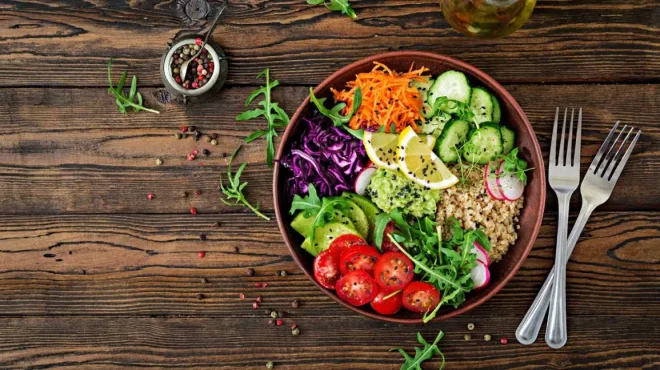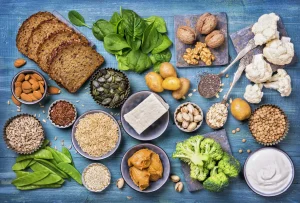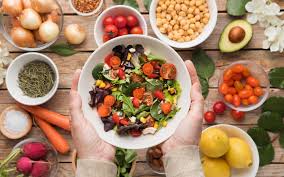
Benefits of a Vegetarian Diet
Vegetables, fruits, grains, legumes, nuts, and seeds are examples of plant-based foods that are commonly included in a vegetarian diet; meat, chicken, and fish are not. All the necessary components for a healthy lifestyle, such as protein, iron, calcium, and vitamins, can be obtained from a well-planned vegetarian diet. Although eating vegetarianism is frequently linked to a lower risk of developing chronic illnesses, there are many other reasons why people decide to adopt this lifestyle. A plant-based diet may be preferred by some for its health benefits, while others may do so due to personal preference, ethical considerations, or environmental effects. Let us discuss the advantages and disadvantages of a vegetarian diet in honour of World Vegetarian Day, which is observed on October 1.

What is a vegetarian diet?
A plant-based eating style that forgoes meat, poultry, fish, and shellfish is known as a vegetarian diet. Rather, it highlights the consumption of a range of meals generated from plants. Depending on the particular kind of vegetarian diet they follow, vegetarians typically eat fruits, vegetables, grains, legumes, nuts, seeds, and dairy products like milk.
1. Lacto-vegetarian
Includes – Dairy products such as milk, cheese, yogurt, and butter.
Excludes – Eggs, meat, poultry, fish, and seafood.
2. Ovo-vegetarian
Includes – Eggs.
Excludes – Dairy products, meat, poultry, fish, and seafood.
3. Lacto-Ovo Vegetarian
Includes – Both dairy products and eggs.
Excludes – Meat, poultry, fish, and seafood.
4. Vegan
Includes – Vegan diet is all about plant-based foods.
Excludes – All animal products, including dairy, eggs, honey, and sometimes other animal-derived substances like gelatin.
What are the benefits of a vegetarian diet?
A vegetarian diet may offer the following health benefits:
1. Healthy weight management
According to the expert, “vegetarian diets tend to be higher in fibre and lower in calories, leading to greater feelings of fullness and reduced calorie intake.” Over time, this can aid in maintaining a healthy weight and help with weight loss.
2. May reduce the risk of heart disease
An relationship between an older person’s risk of dying from cardiovascular disease and eating a healthy vegetarian diet was discovered during a study that was published in the Journal of Nutrition, Health and Ageing in July 2024. Heart-healthy foods like fruits, vegetables, whole grains, legumes, nuts, and seeds are abundant in a vegetarian diet. “These foods can help lower total cholesterol levels and lower the risk of developing heart conditions, including heart attacks,” the expert explains. They are also high in fibre, antioxidants, and good fats.
3. May lower the risk of type 2 diabetes
According to study that was published in the European Heart Journal in 2023, vegetarian diets may aid in the prevention of diabetes. Diets high in plants may aid with insulin sensitivity and blood sugar regulation. Vegetarian diets high in fibre can help reduce blood sugar spikes and slow down the absorption of sugar, which can help control and prevent type 2 diabetes.
4. Improves digestive health
According to research published in the Frontiers of Nutrition in 2019, eating vegetarianism can help to improve gut health by fostering a diverse ecology of beneficial bacteria. Dietary fibre, which is vital for maintaining digestive health, is naturally abundant in vegetarian diets. Constipation is avoided, regular bowel movements are encouraged, and a healthy gut microbiota is fostered by fibre.
5. May reduce the risk of cancer
Research that was published in Plos One in May 2024 suggests that eating a vegetarian diet may help lower the risk of cancer. Plant-based meals contain antioxidants, phytochemicals, and fibre that can prevent damage to cells and reduce inflammation, both of which may minimise the risk of cancer.
6. May promote longevity
People who adopt a vegetarian diet may cut their risk of premature death by up to 30 percent, according to the US National Heart, Lung, and Blood Institute. “People who eat vegetarianism may live longer than those who eat meat, mainly because they have lower risks of chronic illnesses like cancer, diabetes, and heart disease,” claims Haripriya.
7. Enhances skin health
Research that was published in the Nutrients journal in 2023 suggests that eating a vegetarian diet may be good for the health of your skin. A vegetarian diet high in antioxidants, vitamins (particularly A, C, and E), and minerals can help with skin health. Clearer, more radiant skin can result from these nutrients’ ability to fend off free radicals, lessen inflammation, and encourage healthy skin renewal.
8. May improve bone health
The expert states, “Vegetarians who consume plant-based sources of calcium, magnesium, and potassium may have good bone health.” These nutrients are critical for osteoporosis prevention and good bone maintenance, particularly when combined with regular exercise.

What drawbacks come with following a vegetarian diet?
There are certain disadvantages to a vegetarian diet as well:
1. Potential nutrient deficiencies
There’s a chance that vegetarians will be deficient in some vital nutrients, which are mostly present in animal products. Important nutrients to be aware of are:
Vitamin B12 is essential for nerve health, DNA synthesis, and the creation of red blood cells.
Iron is present in plant-based foods like spinach and lentils, however it is non-heme iron. It is less easily absorbed by the body compared to heme iron contained in meat, and can raise the risk of iron-deficiency anemia.
A large number of incomplete plant-based proteins lack one or more necessary amino acids. Deficiencies may result from a diet high in one particular type of plant protein.
2. May cause unbalanced meals
According to the expert, “going vegetarian without proper planning can result in unbalanced meals that lack essential nutrients.” It’s possible that people eat too many processed vegetarian foods, such as veggie burgers and faux meats, which can be deficient in vital nutrients and heavy in unhealthy fats, sugars, and sodium.
3. Increased carbohydrate intake
To meet their energy demands, some vegetarians may mainly rely on foods high in carbohydrates, such as bread, pasta, rice, and starchy vegetables. Blood sugar increases and weight gain are possible outcomes of this.
4. Digestive issues from high fiber intake
An abrupt increase in fibre consumption—which is typical of vegetarian diets—can cause upset stomachs. The expert states that eating too many foods high in fibre, such as beans and lentils, might result in digestive problems including gas and bloating.
5. Increased reliance on supplements
A vegetarian diet may require people to rely more on dietary supplements, such as omega-3 and vitamin B12 supplements, to make up for the nutrients that are lacking in a vegetarian diet.
How to start a vegetarian diet?
In order to guarantee that you are obtaining a balanced dose of vitamins, minerals, protein, and healthy fats when beginning a vegetarian diet, it is crucial to concentrate on nutrient-dense, whole foods. This is how to begin:
Start with “meatless Mondays” or substitute plant-based proteins for meat at one meal a day to gradually make the shift.
Make whole grains, fruits, vegetables, legumes (lentils, beans), nuts, and seeds the main components of your diet. Steer clear of highly processed vegetarian meals.
Ensure that every meal include some form of plant-based protein, such as beans, lentils, tofu, almonds, and seeds.
To keep meals exciting and nutrient-dense, learn new vegetarian recipes. Investigate international cuisines, such as the Mediterranean diet, that inherently promote plant-based diets.
Make sure you are consuming adequate of these vital nutrients. To improve absorption, consume foods high in iron, such as spinach and lentils, along with meals high in vitamin C.
One of the several health advantages of a vegetarian diet is a decreased chance of developing chronic illnesses. But if you prioritise eating full, nutrient-dense meals, you can reap these health advantages. You may experience health problems if you eat a lot of fibre or highly processed vegetarian foods. Thus, before committing to a vegetarian diet, weigh its benefits and drawbacks.

